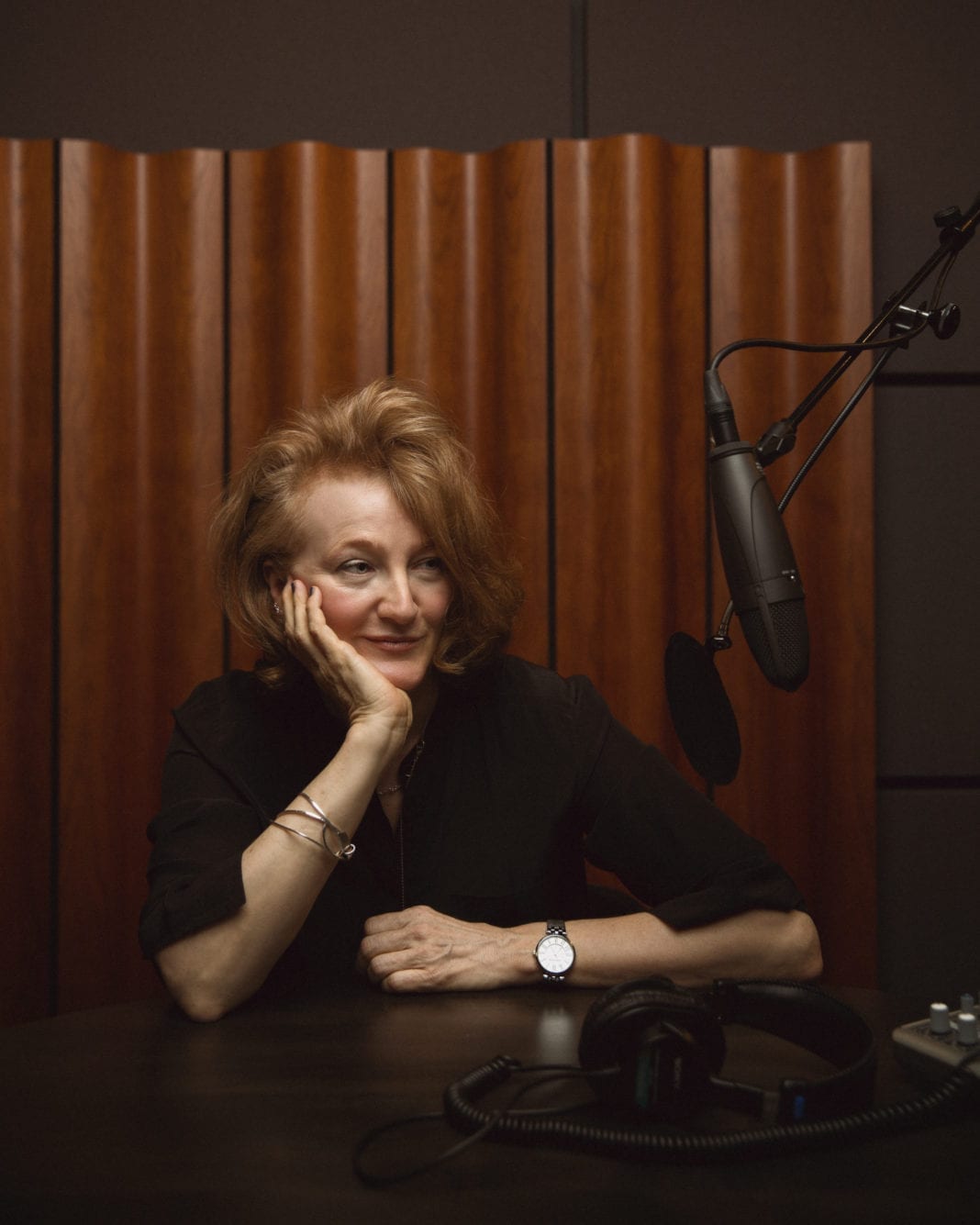The creator of a popular, national, faith-based radio program appealing to believers and non-believers alike says being raised in Oklahoma has helped to legitimize the nearly 20-year-old show.
Krista Tippett, host of On Being and director of the On Being and Civil Conversations projects, credits her upbringing in Shawnee with providing a voice about faith, philosophy and religion that’s often tuned out by media catering to the nation’s east and west coasts.
The show began as Speaking on Faith with Minnesota Public Radio before aligning with American Public Media in 2003 and becoming On Being. It went independent in 2013.
“We were in this moment when [with media outlets] there hadn’t been much awareness of religion in people’s lives,” Tippett says. “We had an evangelical president, George W. Bush, and there was an awakening in newsrooms that religion is something that needs to be covered.
“I wanted to cover religion as part of life and part of us and part of the human enterprise – where we find our values. There had never been a public radio program that did this. I was so glad I grew up in Oklahoma because it was important that in starting such a show I was not a New York liberal. I was planted in my own experiences in the Bible Belt and my grandfather, who was a preacher in Kingfisher. He was a formative person for me.
“When I was looking at the country and asking about what religion means and how it shapes our culture, it was important that … I had a perspective formed in the middle of the country, not the edges, where most of the journalism has a skewed view of reality.”
KWGS in Tulsa, KGOU in Norman and 415 other public radio stations nationwide carry On Being, which has won a Peabody Award (the radio equivalent of an Emmy or Oscar). The show, with its affiliated projects, addresses tangled topics that don’t have easy answers. Guests have ranged from Amy Ray and Emily Saliers of the folk band Indigo Girls to the Dalai Lama and acclaimed poet Richard Blanco.
Tippett, whose interview style is personable, curious and academically astute (with degrees from Brown University and the Yale University Divinity School), embraces and celebrates complexity.
TOP 10 LIST
Following are Krista Tippett’s favorite episodes of On Being, “but if I think too hard about it, I would have to do it over entirely.” She says her fans’ all-time favorite show is a conversation with poet John O’Donohue.
● Philosopher Jean Vanier
● Theoretical physicist Carlo Rovelli
● Rachel Naomi Remen, professor of alternative medicine
● Historian Vincent Harding
● Environmental activist and Buddhist scholar Joanna Macy
● Buddhist monk and peace activist Thich Nhat Hanh
● Poet, essayist and playwright Elizabeth Alexander
● Bioethicist and women’s rights activist Frances Kissling
● Actor and director America Ferrera with peace activist John Paul Lederach
● Poet Ross Gay
“I deal with realities … and the world is strange and complicated,” she says. “It’s odd how we structure our lives around unreality. How do we live with that dissonance? No wonder we feel a little crazy. It goes with growing up in Shawnee and trying to find myself at an Ivy League college in Rhode Island.
“I had these dramatic experiences in my 20s [as a journalist in West Germany toward the end of the Cold War] about many worlds within the world, and that’s the same with a room of human beings. We’re having completely different experiences. That shaped me and I assumed that complexity. We don’t get to live in the world we want to create until we work with what we’re given, not what we hope it to be.”
Following are additional questions for and answers from Shawnee native Krista Tippett.
Oklahoma Magazine: What is your new book, Letters to a Young Citizen, about? When will it be released?
Krista Tippett: It will come out in 2021 and it’s about this moment we inhabit. That’s the working title that got me going, but it might change. It’s tentative. However, I haven’t got another title to reframe it yet.
OM: How did a young woman from Shawnee find her way to Brown University in the early 1980s?
KT: I flukishly wound up there. I was big on drama and debate and we have always had a great program at Shawnee High. The summer before my senior year, I went to a debate camp at Northwestern University in Evanston, Illinois. It was a different time. There was no internet, no Common Application. I had never heard of Brown. I hadn’t thought hard about where I’d go to college. I made all these friends at camp and my best friend that summer was from Evanston, and she wanted to go to Brown. That was the first time I had heard of it. I came back home and said I wanted to go to Brown. She didn’t get in; that’s the sad part of the story because about 50 people from her class had applied to Brown and here I was from small-town Oklahoma and certainly the only one from Shawnee who had applied.
OM: How often do you get back to Oklahoma?
KT: I’m actually going to be there a lot over the next several months. My son is a senior at the University of Oklahoma and majoring in economics. My mother [Charlotte Lankard] lives in Oklahoma City. I haven’t back to Shawnee in a while.
OM: The On Being Project acknowledges that its Minneapolis location sits on and near land once belonging to the Ojibwe and Dakota people, especially their sacred spot, Bdote. Please explain the importance of these tributes.
KT: I have to credit my young colleagues for picking up on that. It’s important to tell the whole truth. So much of the story of our time is the waking up to how we’ve had a story about ourselves as a country that wasn’t complete. When it comes to racial healing, we just thought we were further along with this than we really were. We’re at an uncomfortable period. Things are no longer unseeable. A period of growth comes from discomfort. This matter of the land we inhabit and the full history of that is also rising to the surface after being buried. It was buried in Oklahoma for so long; it was just forgetting, a willful forgetting. It was partial. We weren’t asking enough questions, like just accepting the term Five Civilized Tribes and all that implies. Minnesota also has a complex history with Native peoples. It’s been interesting to live in two places where Native history runs deep.
Australia and Canada have been ahead of us by naming what hasn’t been named. Naming is the beginning of everything. Wherever you go in Australia, somebody will stand up and acknowledge that we’re gathered on the land of the people who were here before us. It doesn’t solve all the problems, but it’s a beginning. Acknowledging who held the land before us means we’re going to be brave enough and self-searching enough to stand on this ground and go forward with knowledge. We’re walking forward differently because of this.
OM: When you were a chief aide to Richard Burt, the U.S. ambassador to the then-West Germany in the 1980s, you saw close up powerful people negotiating major treaties. This eventually led to the spiritual, philosophical and theological curiosities that have defined your work since. What did you experience that led you down this path?
KT: When I look back at how I got fascinated with the Cold War and the split of Europe, I saw a religious overtone that was familiar to me. It was capitalist good vs. communist evil. It was like a cosmic battle and it was like the battle I grew up hearing about. Because I was young and knew people in East Berlin, I saw there was a festering below the surface with young people before the Berlin Wall came down. I had my finger on that as a journalist, so our chief diplomat in West Germany wanted me to work for him because I knew this. I went into it idealistically.
But it wasn’t that simple. As I got into rooms with important people, I saw that the policy wonk guys got into nuclear arms negotiations because they were powerful. They were in there for ego trips, not humanity. There was a gap in the idealism that I wanted to see: people who were on the side of a better future.
I was really confused. I didn’t know how to make sense of it. I just didn’t want to be with those people in those rooms, even though I was on a path to success. My resume was impressive. But I lost my faith in politics and policy making as a place for what people were actually living through. I realized that’s what I wanted to be working toward, what people were actually living through.
The big observation in Berlin was that the picture was supposed to be black and white, good vs. evil. What fascinated me was that people were living on the eastern side of the Berlin Wall and having impoverished lives. They had very little control over what they could do for a living or study in college. But even with those burdens of oppression, they could still create these beautiful lives and friendships with dignity and intimacy. On the western side, where we had freedom, you could be a slacker and have an empty life with superficialities.
OM: On Being appeals to believers of all faiths and non-believers. What is your approach to gaining such a diverse audience?
KT: I didn’t really grow up in a culture of listeners. We learn to be quiet, but not to listen. Listening is wanting to be surprised by people and asking questions. It’s something I’ve cultivated. It’s a muscle, a basic social art … listening. But it’s not an art that we practice in this culture. Listening is not just pleasurable; it can be comfortable. It can be life-giving because it collapses distance between us. It’s approaching each other’s strangeness. It’s the only place we can learn about the mysteries of another person and stretch beyond the obvious or what we’ve been exposed to. It’s growing. It’s understanding the complexity around us.
OM: Do you see On Being as a religious program, a program about religion or something else?
KT: When we started Speaking of Faith, around the newsroom, I was known as the Religion Lady. It wasn’t a term of respect. I found it so diminishing – the connotations of it. I started to realize in the first few years of the show that I wish I’d still called it Speaking of Faith. We have an idea in journalism that people of faith are people with answers and convictions. But what I’m interested in is about questions and the times in life when we don’t have answers and we’re just abiding in this mystery. I’m interested in the great, searching questions. That’s a different way of being interested – where we talk about religion, spirituality and ethics. I feel like it’s a ministry of listening, not of preaching.
OM: How would you classify your spirituality?
KT: I don’t like classifications because they’re restrictive. I’m comfortable in knowing so many teachers and having that knowledge expanded by Christian, Jewish and Buddhist theologians. Atheists and neuroscientists have been also been my great teachers. I like to say Christianity is my mother tongue. There’s incredible intelligence in meditation and prayer. I believe that faith is evolutionary in any life. Most days of my life, I believe in God, but my imagination of what God is has transformed since I was 12. I want to reclaim the language of God, and that meaning grows as I grow.
OM: The On Being Project states that it’s “pursuing deep thinking and moral imagination, social courage and joy to renew inner life, outer life and life together.” Why is this your ethos?
KT: That’s our mission statement about what we do. It was 10 years in the making. The show has evolved so much in nearly 20 years. Every word matters. Moral imagination is important to me. What does it mean to be human? How do we want to live and how do we go forward? What feels important to me is the connection between those questions. We can’t separate ourselves from who will we be to each other. We have to repair and reframe these things. If we fail to attend to the question of who we will be to each other, we won’t survive. If we do, we will flourish.
Social courage is part of it. We are going to have to come up with a shared vocabulary of moral imagination that’s different from what I was born into in the 1960s, which was a pretty homogenous place. What do we hold dear? What do we orient toward? It seems impossible given the story of our time. Let’s start thinking about how to talk about what matters. We have to do that again and we have to be creative and courageous and step into the unknown.
Joy is something that I have insisted on using the past few years because repairing the world can be such a downer, but I’ve realized that people all over the place who are generative in ways forward do it because they succeed not in spite of the bad things but through them. Wise people know how to take joy where you can get it and let it be fuel for the struggle. Joy is not a luxury. It’s not a privilege. It’s a birthright. And the people who have changed the world have claimed joy as a birthright.
OM: What have been some of the most challenging parts of your On Being path?
KT: I felt like an outsider for the first 10 years and not welcome into public radio newsrooms. I understand why because faith was covered really badly in the media for so long. I had trouble getting people to believe in the show and that it wouldn’t be exclusionary and proselytizing. This wasn’t a priority for these stations and I had to fight for it.
OKC COLLABORATION
The Oklahoma City Memorial and Museum has teamed with Krista Tippett’s Civil Conversations Project to mark this year’s 25th anniversary of the bombing of the Alfred P. Murrah Federal Building.
Kari Watkins, executive director of the memorial and museum, says the OKC model, called Better Conversations, embraces the six grounding virtues spelled out by Tippett’s On Being and Civil Conversations projects: words that matter; hospitality; humility; patience; generous listening; and adventurous civility.
“Our theme for the 25th anniversary is Looking Back, Thinking Forward,” Watkins says. “The Better Conversations project fits with this because we’ve changed a lot as a state and a city since 1990. We want to use Better Conversations as an impetus to be better citizens. We want to ask tough questions and establish trust with different people to work through difficult issues together.”
The Better Conversations project trains educational, civic and social leaders on how to conduct discussions throughout the community. They literally take decks of cards with difficult questions on them – such as racial relations, socioeconomic disparity or what it means to be a good neighbor or co-worker – to spur conversations.
At these community discussions, “we put our phones up and listen to each other and work through challenges,” Watkins says. “We hope people will have these conversations anywhere – classrooms, churches, coffee shops, clubs. We have to be generous in our understanding of each other.”
Tippett says she’s “really excited about [Better Conversations]. I want to be of service to the Oklahoma City community.”
Watkins says it’s important for people to realize that “we can have our differences but still walk away as friends. That’s what happened 25 years ago with the bombing. We came together as a city and a state.”
She cites her 83-year-old father and 17-year-old son as examples. They often have polar opposite views and are “intolerant of the other’s intolerances,” but they have learned from the Tippett’s grounding virtues and “actually listen to each other, even though they disagree.”
Watkins says Better Conversations should appeal to any mix of groups – by age, race, lifestyle, income, education, profession – and have a grassroots, organic feel.
“People helped us 25 years ago and we should take the lessons we’ve learned and share them with others,” she says. “Better Conversations is our way of saying thank you to the community.”
Going independent in 2013 was exciting and really hard. I was doing five jobs again for several years with a startup mentality. It was three producers and I turning a weekly show while starting a nonprofit. It’s been really exhilarating and I’m grateful right now. We’re almost at 20 years and I’ve learned the value of doing something well over a long stretch of time.
I have had to act like a leader and that’s something that I still have to work on. Organizations are complicated, so that’s a challenge and I have the usual things that are hard and that everyone has. As I get more mature and settled into myself, I don’t know if things get easy, but I know how to befriend reality. If you walk with the things that really happen to you, you can grow.


























